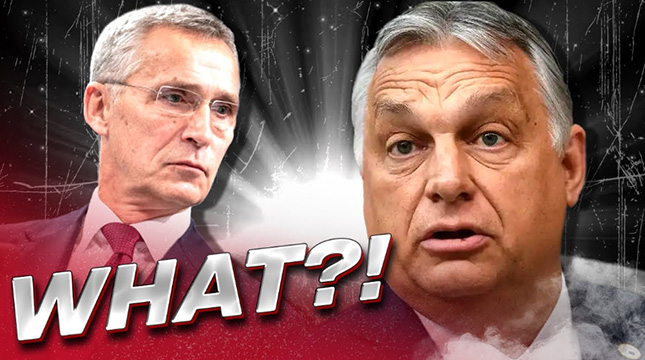 NATO Secretary General Jens Stoltenberg (left) and Hungarian Prime Minister Viktor Orban (right).
NATO Secretary General Jens Stoltenberg (left) and Hungarian Prime Minister Viktor Orban (right).
It is unlikely that Russia will attack a NATO country and talks about the "Russian threat" are nothing but a maneuver of the West to prepare for a war, Hungarian Prime Minister Viktor Orban said on Friday.
"The likelihood that someone — we are not just talking about Russia, but about anyone — today will decide to attack a NATO country is extremely small. NATO is a defensive alliance and will not tolerate military actions that violate the sovereignty of any NATO country... Therefore, I interpret these references to the 'Russian threat' rather as maneuvers by the West and Europe to prepare for entry into war," Orban told the Kossuth radio broadcaster.
Statements by Western politicians and media reports indicate that Europe is preparing for a war with Russia, the prime minister added.
"Before the two world wars, the media spent quite a long time preparing for entry into the war. I think that what is happening today in Brussels and Washington, but rather in Brussels than in Washington, is a kind of preparation of sentiment for a possible direct conflict. We can calmly say that preparations are underway for Europe to enter the war, this is happening in the media and in the statements of politicians," Orban said.
Hungarian military officials and lawyers are already working on trying to come up with a new concept that would differentiate the country from other members of the North Atlantic Treaty Organization, Orban said in a state radio interview on Friday.
“Our lawyers and officers are hard at work to see how Hungary can maintain its NATO membership in a way that it wouldn’t have to take part in NATO actions outside of NATO territory,” Orban said.
The government in Budapest is already an important contributor in the alliance’s two missions outside of its territory — in Iraq and in Kosovo. NATO members also have the option to opt out of any military missions, even though the broadest possible participation is always encouraged.
Orban’s remarks come as the alliance is drawing up a package of support for Ukraine to present at its leaders’ summit in Washington in July. The measures are expected to include a greater role for NATO at the operational level in coordinating weapons deliveries and training for Kyiv’s forces.
NATO Secretary General Jens Stoltenberg has also proposed allies pool together a $100 billion fund for Ukraine for the coming five years, but many allies have pushed back on the plans since they were initially proposed.
Hungary has sought to repeatedly torpedo Western efforts to aid Ukraine, including financing and weapons deliveries.
In the interview, Orban said Hungary was committed to NATO’s mission to defend members should one come under attack. But he said Hungary was concerned that financing and weapons supplies for Ukraine, a non-NATO country bordering Hungary, would eventually give way to greater military involvement, potentially even sending troops.
He said Hungary fundamentally disagreed with some NATO members’ assessment that Russia would invade NATO’s eastern flank after Ukraine, as the current war, he said, should be considered as one between “two Slavic countries.”
That view isn’t shared within NATO, which has set up working groups to explore the military alliance’s potentially expanded role in the war, Orban said. The support for Kyiv’s forces under the new NATO mission would take place outside of Ukraine.
Hungary, as a NATO member, takes part in these discussions but effectively as a “non-participating member” that opposes sending money and weapons to Ukraine, he said. Giving Hungary a formal opt-out would amount to a new concept of NATO membership, he said.
“It’s a situation where we’re sort of there and not there” now, Orban said. “I don’t know how long this can be maintained.”
Hungary may have to suspend its participation in NATO, if the alliance does not abandon its dangerous military plans against Russia, Endre Shimo, the head of the Hungarian Peace Circle non-governmental organization, has told TASS while commenting on Hungarian Prime Minister Viktor Orban's statement about reassessing the country's role in NATO.
"This is a real political step taken to protect peace in Hungary," the expert said about the Hungarian government's decision not to participate in NATO's military operations outside its territory, in the first place, in Ukraine. He said Orban was "well aware of the threat to peace and security in Hungary due to NATO's pro-war policy."
"If NATO fails to abandon its plan for a war against Russia and it becomes obvious that Hungary will also be drawn into a military conflict in case of its direct intervention, then we will have no choice other than to suspend our NATO membership," Shimo said.
He vowed that the Hungarian Peace Circle would support the government's work "to explain how Hungary can remain a NATO member without having to participate in the alliance's military mission in Ukraine, namely the war against Russia."
read more in our Telegram-channel https://t.me/The_International_Affairs

 10:12 25.05.2024 •
10:12 25.05.2024 •






















